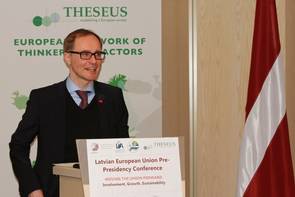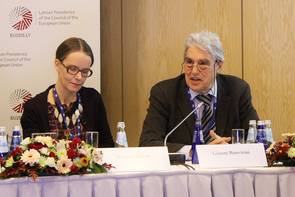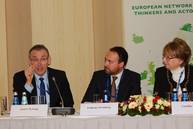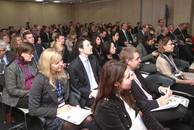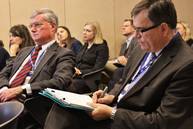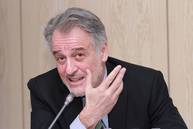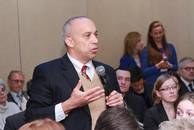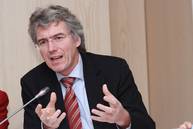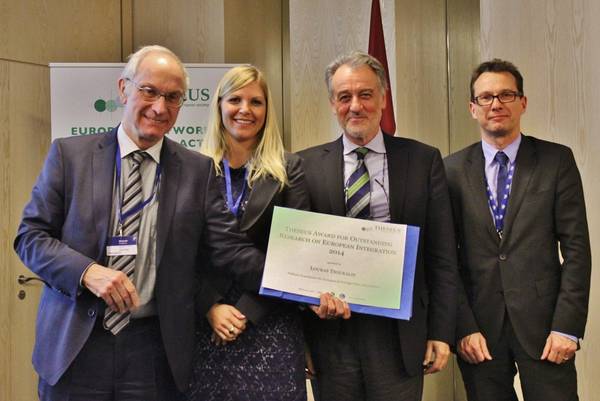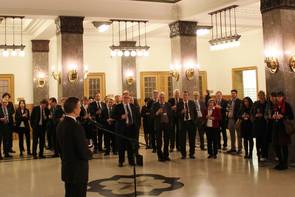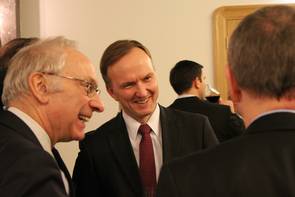

THESEUS Conference 2014
“Moving the Union forward: Involvement, Growth, Sustainability”
Riga, 4 December 2014
The THESEUS Annual Conference 2014 took place at the occasion of the Latvian EU Pre-Presidency Conference “Moving the Union forward: Involvement, Growth, Sustainability” on 4 December in Riga. It was an official event of Latvia's presidency of the Council of the European Union starting in January 2015. At the conference, Latvia stated its ambition for the presidency, that is to foster a competitive, engaged and digital Europe. Many politicians and scientists participated in the conference to discuss the Latvian presidency's working agenda and further topics of EU politics. The conference invited interested young researchers to participate.
"Yes, we are ready”, stated Lolita Čigāne, member of the Latvian Parliament, in her opening speech at the EU Pre-presidency conference in Riga. “We are highly motivated for this presidency and we want to work closely together with our European partners to make the best out of it." Holding the EU Presidency meant the chance as well as the obligation to get deeply involved in central EU topics. "We want to use this to work on a competitive, engaged and digital Europe”, said Inga Skujiņa, Ministry of Foreign Affairs of the Republic of Latvia.
Building a competitive, engaged and digital Europe
Andris Spruds, Latvian Institute of International Affairs (LIIA), as well as other country representatives of Latvia underlined the ambitions of their country, which was highly appreciated by other international speakers such as Jaap de Zwaan, THESEUS board member and Secretary-General TEPSA. He referred to the Lavtian EU Presidency as chance to further work on the stability of the EU's system while pointing to the importance of staying realistic on which aspects can and should be achieved within a six-month presidency to set the agenda accordingly. One central concern of de Zwaan was to better address EU citizens and to regain their trust. Frank Suder, Fritz Thyssen Foundation Germany, supported this point and stated that the EU needs valid and reliable relations among its partners and should work on shaping a European society that shows unity while respecting members' different cultures and historical backgrounds.
TEPSA EU Presidency recommendations
Before turning to discussions on selected EU topics, the conference participants listened to recommendations to the Latvian presidency, defined by members of the Trans European Policy Studies Association (TEPSA) and presented by Michal Kořan, Institute of International Relations (IIR) in Prague. The scientist encouraged Latvia to pursue its definied priorities, while making sure that (1) sustainable solutions for questions on the EU's migration and asylum policies are found, (2) countries better define and follow economic and financial guidelines, (3) the EU works on its common strategy in energy policy, (4) a common and functioning security approach through a global – not soley European – strategy is found and (5) the state of the art of cyber security within the EU is improved.
Central issues of EU politics under debate
The TEPSA Presidency Recommendations were followed by four insightful panels on selected EU topics. Panel I dealt with citizens’ concerns in a stronger EU adressing insecurities regarding its institutional and economic development. The panellists discussed for instance about the importance of building perspectives for today's children and to clarify contents of Russian news coverage, distributed to other countries. Panel II depicted the EU in the international arena. Topics debated where transatlantic partnerships, mainly the planned transatlantic trade and investment partnership with the US (TTIP), development cooperation and international security.
After the lunch break, two parallel panel sessions took place. Topics were “Eastern Partnership as a Community of Values and Interests?”, European energy policy, “Central Asia as a Priority of the Latvian EU Presidency” and the digital market and its possible driving force for growth and jobs within the EU. On the panel about European energy policy, THESEUS Project Manager Mirja Schröder, University of Cologne, gave insights in the Southern Gas Corridor (SGC), planned by the EU Commission, with a focus on the role which Turkey could play if the EU's SGC should be realized. Her presentation was a snapshot of an interdisciplinary research project of scientists of the Jean Monnet Chair of the University of Cologne and the university’s Institute of Energy Economics (EWI) in cooperation with Middle East Technical University (METU), Ankarra.
Different policy fields, same concerns
Although all panels of the Latvian EU Pre-Presidency conference depicted very different topics of EU politics, some aspects reappeared in all of them: improving the EU's interior coherence, regaining citizens' trust and preparing the EU for global challenges, no matter if in foreign or digital policies. All speakers shared their interest for the European project, and agreed – one more than the other – that the EU is facing challenging tasks that ask for immediate, ambitious and structured actions to be tackled.
THESEUS Award Ceremony
The official part of the conference was closed by concluding remarks of Jean Monnet Chair Wolfgang Wessels, followed by the THESEUS Award Ceremony, in which Loukas Tsoukalis, Hellenic Foundation for European & Foreign Policy (ELIAMEP), was awarded the THESEUS Oustanding Award for his great achievements in research on European integration. Referring to THESEUS' mission statement, Wessels complimented Tsoukalis for being both a thinker and an actor within the context of European politics and cherrished that Tsoukalis did not recede from keeping his attentiv and critical view on EU developments.
"Being critical goes together with being a good European."
The Greek scientist appreciated his award and stated that it was without question for him – who experienced his own country under military dictatorship – that "being critical goes together with being a good European". Tsoukalis said that the European project had always been identified by him with "peace and open borders, democracy, economic development and inclusive societies in a continent confident in its diversity and proud not only of its past".
The THESEUS Award for Promising Research in European Integration 2014 goes to Joseph Lacey, European University Institute (EUI). It will be handed over in early 2015.
The official part of the Latvian Pre-Presidency Conference ended with a reception at the Latvian Ministry of Foreign Affairs. After a short keynote address by Andrejs Pildegovičs, Latvian State Secretary for Foreign Affairs, conference participants engaged in lively talks on the topics discussed earlier that day and those going beyond.
The Latvian EU Pre-Presidency Conference was a great platform for not only debating Latvia's presidency priorities, but also to visualize broader EU challenges and to reflect these from a multitude of interdisciplinary and international perspectives. The conference gave participants the opportunity to build networks for future exchange of thoughts and working cooperations.
The Latvian EU Pre-Presidency Conference “Moving the Union forward: Involvement, Growth, Sustainability” was jointly organised by the Latvian Institute of International Affairs in cooperation with the Trans European Policy Studies Association (TEPSA), the THESEUS Network and the Latvian Presidency of the European Council of the European Union, and with the support of the European Commission Representation in Latvia, Fritz Thyssen Stiftung and the European Parliament Information Office in Latvia. It was an official event of the upcoming Latvian EU Presidency, starting in January 2015.
